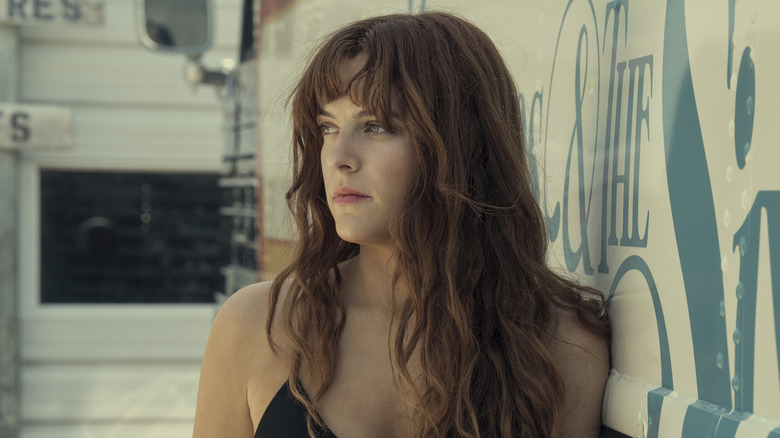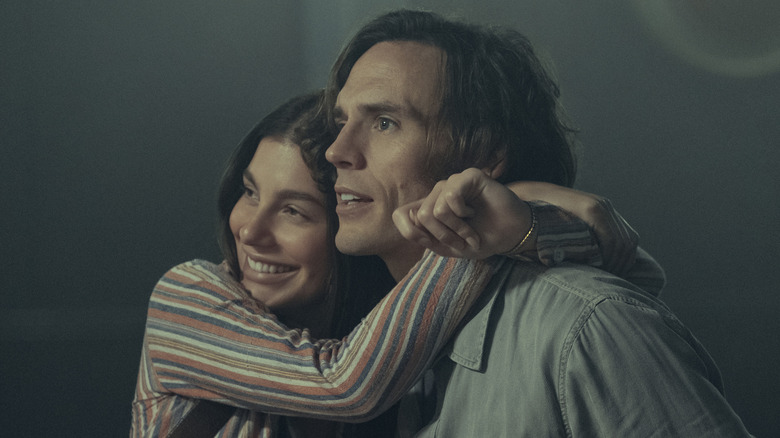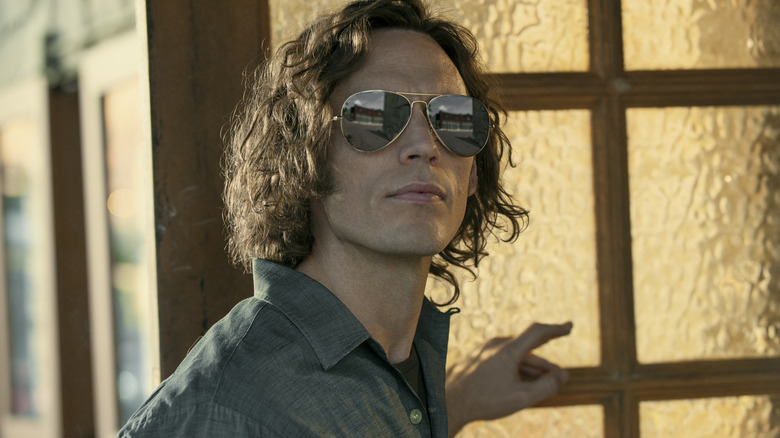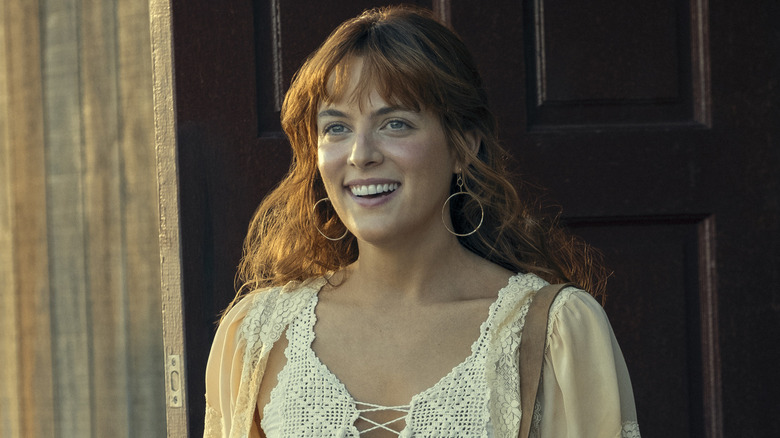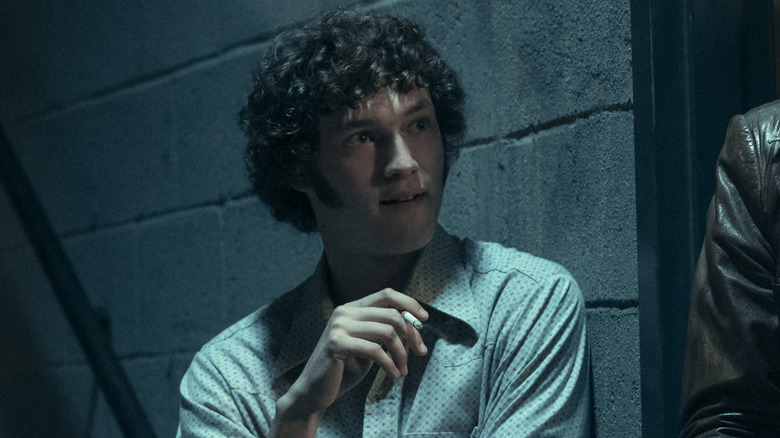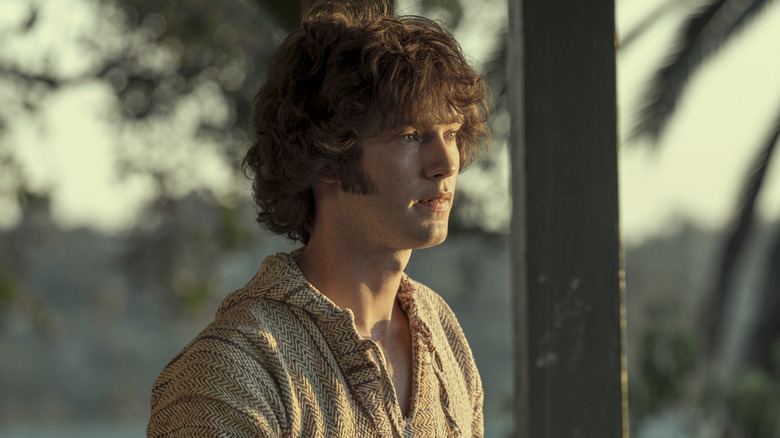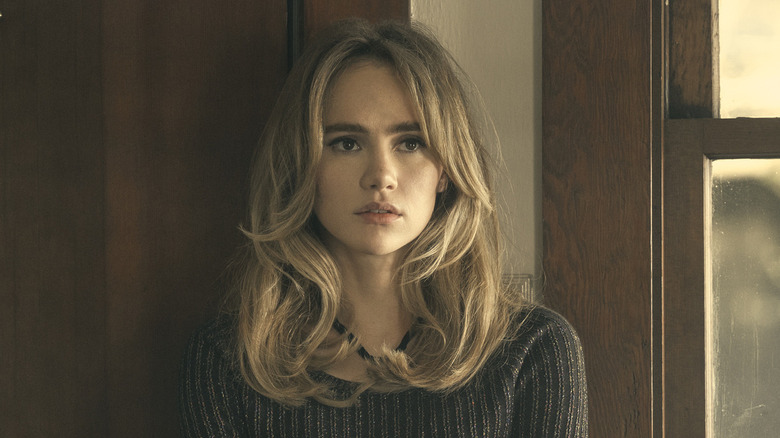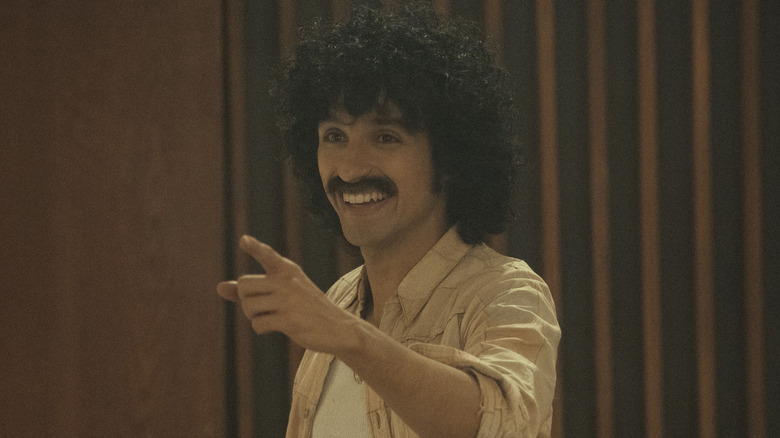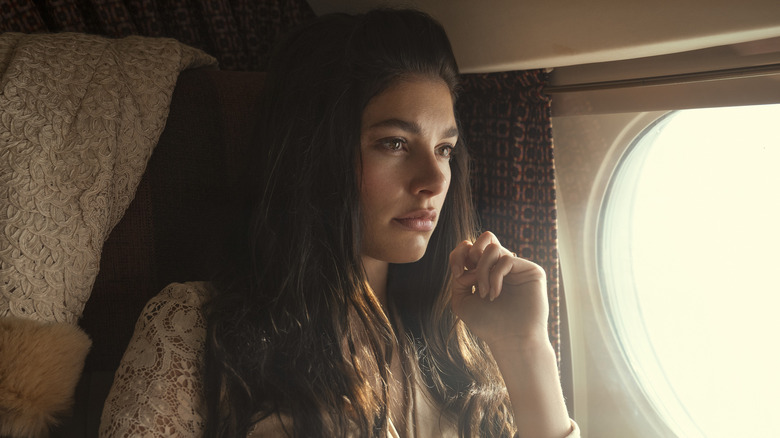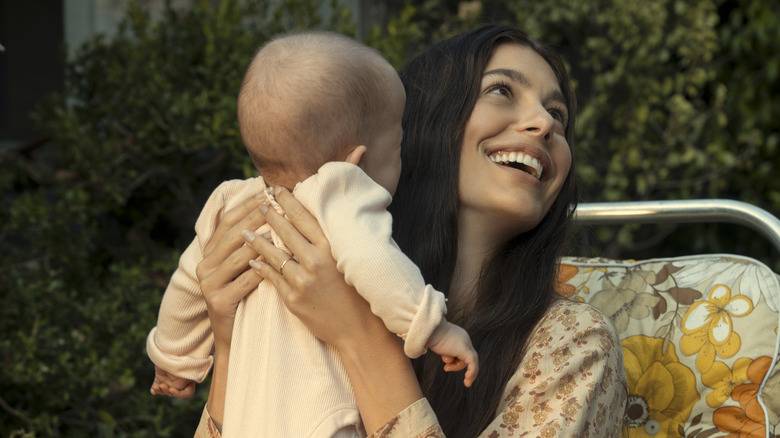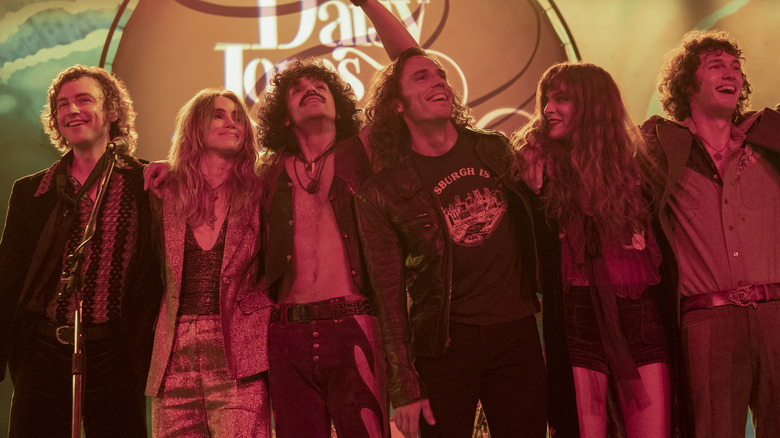The Ending Of Daisy Jones & The Six Explained
Are you ready to hear the story of one of the most famous fictional bands of the 1970s? The Amazon series "Daisy Jones & The Six" is about The Six, a band that had a meteoric rise to fame after their single "Look At Us Now (Honeycomb)" topped the charts. The band consists of singer/songwriter Daisy Jones (Riley Keough), songwriter/guitarist Billy Dunne (Sam Claflin), guitarist Graham Dunne (Will Harrison), bass player Eddie Roundtree (Josh Whitehouse), drummer Warren Rojas (Sebastian Chacon), and keyboardist Karen Sirko (Suki Waterhouse). Along for the ride are Billy's wife Camila (Camila Morrone) and Daisy's friend and fellow singer Simone Jackson (Nabiyah Be).
At the height of their career, The Six disbanded and went their separate ways. Now they are finally sitting down to tell the story of why they broke up at the peak of their fame. What follows are the explicit details of everything, from why the band formed to what caused some members to reconsider their futures and how the work impacted their lives. Their road to success wasn't easy, and it certainly wasn't predictable.
What caused their breakup? What was life like as part of The Six? Who was behind their hit song? We're breaking down everything you need to know about the ending of "Daisy Jones & The Six." Spoilers ahead.
The following article discusses drug and alcohol use. If you or anyone you know needs help with addiction issues, help is available. Visit the Substance Abuse and Mental Health Services Administration website or contact SAMHSA's National Helpline at 1-800-662-HELP (4357).
How did Billy and Camila's love story end?
Billy and Camila go through a lot over the course of the series. As the final episode winds to a close, it looks like their marriage may end in the wake of Billy's relapse and Camila's distress over his possible relationship with Daisy. While nothing is fixed overnight, they live a life together, raising their daughter Julia and stepping away from the rock star grind.
Their love story is one for the ages. While happy endings are common, it isn't every day that audiences can watch someone in Billy's position put the work in to grow as a person and gain back his family's trust, especially after they already went through that cycle once before. It shows the dedication Billy has to his family, the love he has for his wife and child, and what he's willing to do (and give up) to ensure he gets to spend his life with them. It's endearing in the best possible way.
Their growth comes across as natural and realistic. Camila didn't immediately let Billy back into her life either time he hurt her, which is a welcome change from most media depictions. The way Billy keeps himself busy with home renovation projects after leaving rehab the first time also makes sense. He needs to keep his mind occupied, and giving himself building projects is the way to do it, which makes his recovery — and how long he stays sober — entirely believable.
Billy puts in the work to better himself
During the band's first tour, Billy takes the rock star mentality to heart. He begins abusing drugs and alcohol, resulting in some detrimental choices on his part. It isn't until their producer Teddy Price (Tom Wright) shows up to take him to the hospital to meet his daughter that Billy realizes he's gone too far. After his first visit to rehab, Billy continues to put in the work to stay sober. In the last episode, he calls Teddy from a bar and tries to ground himself as he begins to spiral, but he relapses after hanging up the phone.
Billy goes back to rehab after his slip-up. He also begins therapy, trying to work through different aspects of himself as part of his personal growth. In showing how therapy helped him, the series is helping shed a positive light on mental health treatment. There is a significant stigma over mental health treatment and therapy, and showing how it helps Billy win back his family is a step in the right direction.
The songwriter isn't always good about asking for help. It's important to have someone you can look to for support in any type of recovery, someone you can be vulnerable with. Billy calls Teddy, but he doesn't open up about how he's feeling at that moment or ask Teddy to help him. It's a reminder that asking for help and being vulnerable with your emotions is never a bad thing.
Daisy builds a new life
Daisy is a bit of a dreamer. She grew up with a privileged life, never having to want for material things. However, she is very different from her parents, who were involved in high society life. Daisy enjoys her success in music but also struggles with demons. She uses drugs in a misguided effort to escape from the harsh realities of the world. In the end, Daisy realizes she needs help. Teddy arranges for her to go to rehab, with Simone assuring her that she will be away from the prying eyes of the press.
The older Daisy being interviewed describes her life after going to rehab. She is more adjusted, she can be there for her daughter, and she has a career in music. She says that everything she has is because she left the band that night and went to get help. In falling to one of her lowest points, she was able to build a new life for herself. While it isn't something we like to think about, it is sometimes in our lowest moments that we realize how to grow into the person we want to be.
Daisy is more than the lead singer of a popular band. She's an example for those trying to live a dream their families don't approve of. She worked a less-than-stellar hourly job while trying to make her dreams a reality. Though it may not seem like it, Daisy shows viewers that anything is achievable with the right amount of effort.
Graham goes back home
Billy's younger brother Graham is the one who had the idea for the band initially. His experience isn't the main subject of the series, but audiences still watch as he struggles with his place in the group and with being romantically involved with Karen. When she becomes pregnant, he is ready to provide for the child. However, he wants her to quit the band, completely negating her wishes and her want for a child-free life. He says he can adapt and be on the road the way she wants, but Karen knows otherwise.
While Graham enjoys his time with the band, traveling all the time isn't what he wants deep down. But, despite knowing this, he still needed a push to walk away. It's a reminder that we aren't always the best at both recognizing what we need and then implementing it in our lives. Sometimes the only way we realize what we need is when someone we love spells it out for us.
Graham is also an example of how life can get away from us. Sometimes we start a new job or move to a new place and we let that consume us. In the younger Dunne brother's case, the band both consumes his life and puts his other wants on hold. When we let something take over our entire lives, there is always a downside. It's always good to remember to make room for the other parts of life we want to experience.
Eddie stays in the industry
In the final episode of the series, Eddie confronts Billy about his struggles. During what would be their final show in Chicago, Billy tells him he's out of the band. Eddie takes this to heart, getting into a taxi instead of on the tour bus the next morning. He goes on to form his own band. While his new band never reached the same levels of success, he at least got to have more creative control over the music.
Eddie doesn't necessarily seem happy in his interview, though. He says his life is "fine," but there's a bit of resentment to his tone. His life path is an example of what happens when someone gives up their success. While they may be happy to do it initially, there will always be some regret. You could argue that he's right to feel bitter about his life choices. To have experienced the exponential rise he had with The Six is almost unprecedented.
Eddie's story serves as a reminder that we all have choices to make. Our lives can't move forward without them. These decisions may cause us pain or to look back and wonder what could have happened instead, but that doesn't change the fact that we have to make them. If we don't, we remain forever stagnant. If Eddie hadn't made the decision to confront Billy, he might still be wondering how far he could go on his own.
Karen found her own voice
Audiences meet Karen as she plays the keyboard for a different band. When The Six moves to Los Angeles, they quickly secure her as their keyboardist. She asks Camila if it's worth it to switch over to their band, and she gives an emphatic yes. As the band falls apart, Karen is on the bus, waiting to head to the next stop. She knew she was meant for a life on the road, and that's exactly what she gets.
Karen is one of the only characters that fulfills her dreams completely without too many hiccups along the way. Her goal is to tour the world performing music and she does just that, first with the band audiences see her with at the beginning of the show, then with The Six, and finally as her own act. Not only is she playing music around the world, but she's the frontwoman. She achieves everything she set out to when she introduces herself.
But, did it come at a cost? Karen and Graham are two sides of the same coin. He bounced before music could consume him, giving him the time to start a family and create a life, while she let music consume every aspect of her being. Sure, she has her success to show for it, but she doesn't have a friend or partner by her side to share it with. It reinforces that you shouldn't let something take over your life to the detriment of everything else.
Warren keeps marching to the beat of his own drum
Warren encouraged Eddie to stay with the band that night in Chicago. When Eddie gets in the cab instead, Warren's face falls, clearly upset and recognizing the significance Eddie's departure will have on the band. The drummer of The Six doesn't let the demise of the band keep him down, though. He becomes a session drummer. A clip even shows him working with Daisy on her music. In his personal life, he marries an actor he met while performing with The Six and they raise twin daughters.
The drummer is the epitome of making the best out of a difficult situation. Many people would have let the breakup ruin them or turn them bitter. Instead, Warren continues in his career, doing what he loves and helping other musicians bring their music to the masses. He brings his positive energy to other albums, never letting the downfall of The Six control his life.
Warren is a great example of why it's important to be positive, even when it seems like your world is caving in. He shows that better days are on the horizon, and that with an optimistic outlook, anything is possible. Everyone needs that reminder sometimes.
Simone and Bernie start a business
Daisy's friend Simone has a much different experience in the music industry than The Six. She is shut down at every step of her journey, partly because of her sexual orientation. It isn't surprising that after everything she endured, she decided to take a step back and open a club with Bernie (Ayesha Harris) instead of pursuing her own career.
Simone's story, though not as prevalent as Billy's or Daisy's in the series, is an important reminder that there is no one route to success and that everyone will have a different experience in an industry. As women in music, Daisy and Simone had significantly different experiences that impacted their ability to put their music into the world. While Daisy isn't harassed by a record producer on screen, Simone is, and her rejection of the man causes the label to walk back her album release. It speaks to the struggles women face in the workforce and how their reactions can make or break their careers.
While she seems happy with the direction of her life, Simone doesn't achieve her goals. When she and Daisy meet, the two are trying to make it in the industry, but only one of them manages to truly achieve this. Simone is unwilling to change herself for her dream, which is admirable. It's a reminder that you should never compromise who you are just for the sake of success.
What are Camila's last wishes?
As the interviews come to a close in the final episode, it's revealed that Camila's interviews were filmed before the rest of the band's. Camila became ill, so her interviews were conducted before she sadly passed away. In the footage, Camila asks the interviewer to tell Billy to call Daisy after enough time has passed. She recognizes that there will always be something between Billy and Daisy. In her death, she didn't want her husband to be alone for the rest of his life.
The notion of someone's spouse arranging a new partner for them from the afterlife isn't new in Hollywood. However, "Daisy Jones & The Six" does a better job with it than most. Camila takes an insecurity she has and turns it into something positive. She chooses to let go of that feeling in death and encourages her husband to follow his heart to the second love of his life. Often in movies and TV, we see them trying to find a new person. In Camila's case, there is already someone. She just needed to push Billy in that direction.
We don't know how the next chapter plays out for Billy and Daisy. But, we can speculate that, in coming back together, they begin to write music and find their creative partnership again. It reminds audiences that the death of a loved one doesn't have to mean the end of your life. For some, it is simply the beginning of a new chapter, even if it isn't an anticipated one.
Who was interviewing the band?
It isn't initially revealed who is interviewing the band. It's assumed they agreed to speak to a particular news outlet and that one of their reporters is behind the camera. It makes sense that someone would be interested in where the band is decades after they suddenly left the industry at the height of the band's fame. But, when the camera pans, it's revealed that the voice behind the camera is actually Billy's daughter, who is now an adult. She is the one planning to share their legacy with the world.
It's a beautiful full-circle moment. It suddenly makes sense why everyone in the band and those associated with them agreed to sit down for an on-camera interview after years of never sharing their stories. It also explains why they are all so candid. They all knew Julia from the time she was born. The former members of the band haven't really kept in contact over the years, but it makes sense that they'd come together in such a way for someone they know.
It also goes to show who is the best person to share a legacy. While a music journalist would no doubt do a decent job, someone close to the band with the intimate knowledge that Julia has will craft a more nuanced narrative. In turn, it will be a more thorough and engaging piece that will give fans everything they want to know, and maybe even something they didn't realize they needed to know. Who better to carry the torch than Billy's child?
Recovery is an uphill battle
Drug use and dependence is a prominent theme of the series. Audiences watch Billy struggle with addiction on The Six's first tour, and then as Daisy uses pills to escape her feelings when the band goes on another tour. Both have significant events that cause them to change their actions, with the birth of Billy's daughter and Daisy's near overdose. For Billy, it means cutting out drugs and alcohol. For Daisy, it means she limits her intake, both in terms of quantity and when she uses.
The miniseries is an excellent reminder that recovery is always an uphill battle, no matter how long you've been sober. Both have to put in the work not just to get clean, but to maintain it. It requires patience and kindness from those around them and understanding when things don't always go as hoped. "Daisy Jones & The Six" not only shows the hard work people put into their sobriety, it also makes it clear that they will always need help from those around them to maintain it.
This part of the story is also an example of how someone can reject the influence of their environment. Even in being around Daisy and the others as they drink, Billy is able to maintain his sobriety. He doesn't allow his surroundings to influence his actions. It's something that people in his situation can look to for strength.
The legacy of The Six
What is the legacy of The Six? In his interview, Graham mentions that while driving around, he heard one of their songs on a classic rock station. He seems surprised that people are still playing their music and that new people are getting into it. It's like he's forgotten how popular they were and that they had a number one single in their prime.
Music is an ongoing legacy. As soon as it's in the world, there is always the possibility that new audiences will discover it. Radio stations and Spotify playlists are a great way for this to happen today. And, there is always the chance that someone picks up a new CD or record in a second hand store.
While Graham is surprised that stations would still play their music, it makes sense. Despite their time as The Six being shorter than most bands, they made a big impact, and there will always be an audience that remembers that. Even if that audience fades, a new one could be just around the corner, discovering their music on any number of platforms and learning the lyrics to "Look At Us Now (Honeycomb)" so they can sing along.
